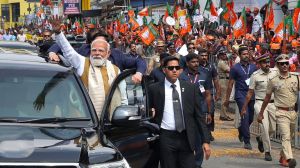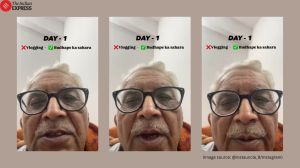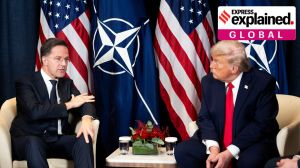Hello, Mr Terrorist, please come in
The Government of India has approved ordinances to withdraw the Prevention of Terrorism Act POTA, 2002, and to amend the Unlawful Activiti...

The Government of India has approved ordinances to withdraw the Prevention of Terrorism Act POTA, 2002, and to amend the Unlawful Activities Prevention Act, 1967. In doing so, the UPA has fulfilled its commitment to the Common Minimum Programme but the country has regressed in its commitment to fighting international terrorism.
Ironically, the Congress government had passed the Terrorist and Disruptive Activities Prevention Act or TADA in 1987, which gave stringent powers of search and seizure to the police. There were instances of the Act being misused for political purposes. The Supreme Court nevertheless upheld its constitutional validity in Kartar Singh vs State of Punjab 1994, considering that the country was in 8216;8216;the firm grip of spiralling terrorist violence8217;8217; and 8216;8216;there were countless serious and horrendous events engulfing many cities with bloodbath, firing, looting, mad killing, even without sparing women and children, and reducing those areas into a graveyard8217;8217;.
TADA was eventually allowed to lapse in 1995. The Law Commission of India recommended in April 2000 the adoption of a law designed to deal firmly and effectively with terrorists and their activities. When the very existence of a liberal society is at stake, they opined, drastic measures meant to strengthen law enforcement and the maintenance of public order are a necessary evil. Meanwhile the country was witness to major terrorist incidents like hijacking of the Indian Airlines flight IC-814 to Kandahar in 1999 and the assault on Parliament on December 13, 2001. The Government was thus obliged to enact POTA.
This Act was also criticised on the ground that it gave extraordinary powers to law-enforcement agencies, which were misused. It was also argued that the existing laws of the land were adequate to deal with the problem of terrorism. If a law is to be scrapped because it is misused, then perhaps most of our laws will have to be dumped in the Indian Ocean. The proper approach in such cases is to punish those who misuse the law. And, it is sheer hypocrisy to say that the existing laws are adequate to deal with terrorism. M N Venkatachaliah, former chief justice of India, when asked whether POTA should be scrapped, said that what was necessary was regulation and not the scrapping of POTA.
The details of the proposed amendments to the Unlawful Activities Prevention Act, 1967, have not been made public except that the revised legislation would have a 8216;8216;milder8217;8217; definition of terrorism, and that it will exclude provisions of POTA which placed the onus of proving innocence on the accused and the admissibility of confession made before a police officer as evidence. It is necessary to place on record that POTA had diluted many provisions of TADA: the period in police custody was reduced from 60 to 30 days; the period of judicial custody was brought down from one year to 180 days; and the minimum punishment was scaled down from five to three years. And now, we are going to have an even milder Act.
Has the terrorist threat abated? Have we controlled cross-border terrorism in J-K? Have the insurgent groups of North-East been put down? On the one hand, we have been crying hoarse at all international fora that India is a victim of cross-border terrorism, that the ISI is promoting fundamentalism within the country, that Bangladesh is sheltering North-East8217;s insurgent groups, and in the same breath, we have been systematically blunting our anti-terror laws. It is indeed most unfortunate that the leaders of the country are playing political games with the country8217;s national security.
How are other countries responding to the challenge? Soon after 9/11, on October 26, 2001, President Bush approved the USA Patriot Act to deter and punish terrorist acts in the United States and around the world. The Act gave sweeping powers to domestic law enforcement and international intelligence agencies. The US President also signed a Military Order on November 13, 2001, authorising the detention, treatment and trial of certain non-citizens as part of the war against terrorism. It stated that the terrorist attacks on September 11, 2001, had created a situation where it was 8216;8216;not practicable to apply in military commissions under this order the principles of law and the rules of evidence generally recognised in the trial of criminal cases in the United States district courts8217;8217;.
The UK already had Terrorism Act, 2000, with a comprehensive definition of terrorism. In the wake of 9/11, another Anti-Terrorism Crime and Security Act ATCSA, 2001, was passed, which is even wider in scope and includes provisions for additional powers to the police, measures relating to information sharing and security of airports and laboratories. The ATCS Act further empowers the Secretary of State to 8216;8216;certify8217;8217; an individual as an international terrorist if the Secretary of State 8216;8216;reasonably8217;8217; a believes that the concerned individual8217;s presence in the UK is 8216;8216;a risk to national security8217;8217;; and b 8216;8216;suspects that the person is a terrorist8217;8217;. Upon certification, a non-UK national can be detained without charge or trial for an unspecified and unlimited period of time if the concerned individual8217;s removal or deportation from the UK cannot be effected. Can we imagine having such a provision in our laws in our country? France, Canada, Australia and Japan also enacted new laws or made the provisions in existing anti-terror laws more stringent after 9/11.
The above analysis brings out two striking features. Firstly, that we took one step forward when we enacted TADA but since then we have taken two steps backwards, one when we passed a diluted POTA and the other when we are going to have a milder UAPA. All other countries have moved forward only by enacting stricter laws or filling up the lacunae in their existing laws. Secondly, there has been no political tug-of-war in other countries over the enactment of anti-terror laws. Does is not show our lack of seriousness in meeting the greatest threat to national security?
The tragedy of the situation today is that even though we have been grappling with terror in this country for the last nearly 50 years ever since Phizo raised the banner of revolt in the Naga Hills, we have yet to formulate our anti-terror policy and continue to dilly-dally with our anti-terror laws.
The Security Council Resolution 1373 2001, while expressing its 8216;8216;unequivocal condemnation8217;8217; of the terrorist acts as 8216;8216;threats to international peace and security8217;8217;, called upon all the states to take comprehensive measures to freeze without delay funds and other financial assets of persons who commit, or attempt to commit terrorist acts, and ensure that any person who participates in terrorist acts is brought to justice, etc. It is very doubtful if the mild UAPA will meet the requirements of the Security Council Resolution.
Lord Denning was of the view that 8216;8216;the freedom of the individual must take second place to the security of the State8217;8217;. In our country, unfortunately, political considerations take precedence over all other factors, including national security.
The writer is former director general of the BSF, ex-UP and Assam DGP
- 01
- 02
- 03
- 04
- 05































